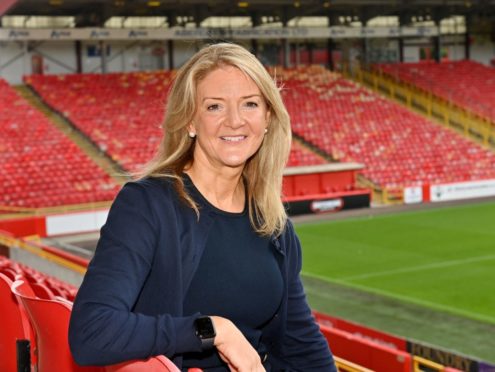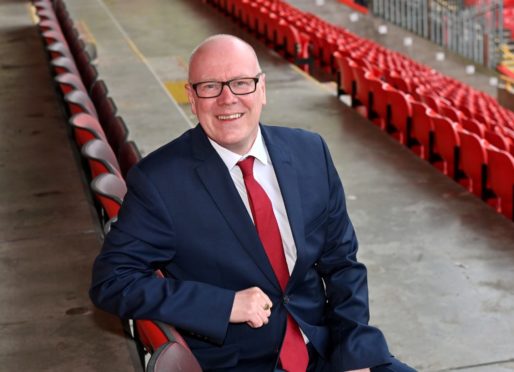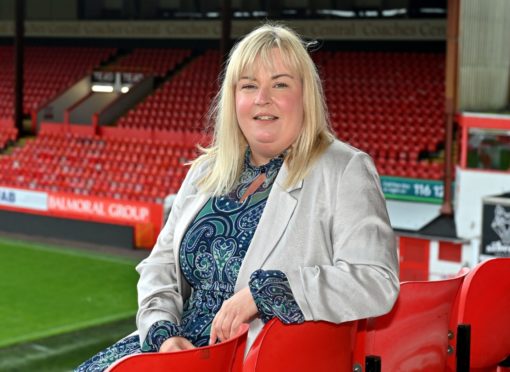A “life-saving” mental health initiative which provides support through Aberdeen FC has been extended.
The Changing Room was launched in 2018 as a way of helping men open up about their mental wellbeing in a setting they feel comfortable with.
Set up through a partnership between SAMH and the SPFL Trust, the 12-week project has helped thousands of football supporters who are struggling with their mental wellbeing.
Now the AFC Community Trust – along with the charity arms of Hearts, Hibs and Rangers – has become the first to roll out an extended version of the initiative thanks to funding from the Scottish Government.
The Changing Room – Extra Time was officially launched at Pittodrie on Monday.
Football has ‘special part to play’
It increases the support available by offering more in-depth sessions to people who have already used its services, and it will also be opened to women for the first time.
Government ministers have committed £100,000 to the extension, which will also see more clubs across Scotland sign up to offer the initial Changing Room course.
“The need for men to actually talk about their mental health is so important, and I don’t think men are particularly good at it,” said Liz Bowie, chief executive of the AFC Community Trust.
“Women will sit down over a coffee and talk about how they are feeling whereas men don’t do that as much.
“We are hoping the power of football will encourage them to open up in a different setting.
“We have got a really special part to play. There is a real need, and football is a place where men can feel safe. Trusts and football clubs have a responsibility to engage and build a supportive environment.
“The trust has a really good pedigree of working with people around their mental wellbeing, and Still Standing Free exemplified that. We are really proud of what we do around mental health and we hope Changing Room can be an extension of what we have already managed to do.”
Project ‘can be game-changer’
Kevin Stewart, the Scottish Government’s minister for mental health and social care and the MSP for Aberdeen Central, said Extra Time could be a “game-changer” for the country’s mental health crisis.
Men under 45 – who also make up the majority of football supporters in Scotland – are more likely than any other group to die as a result of suicide.
“This is a great way to get men in particular to speak about their mental health and wellbeing,” Mr Stewart said.
“They are often a group who are unwilling to open up and we have seen that initiatives like this can make a huge difference in terms of getting folk to speak out about what they are experiencing.
“Our commitment towards this is £100,000 and I believe that is money which will be well spent. The community trusts have already done a huge amount of work around mental health, and this allows more of that work to continue.
“Football and sport can be really useful in helping folk open up. If people out there see their favourite team or player talking about mental health it could encourage them to do the same. It could be a real game-changer.”
Lives saved through initiative
Bosses at SAMH are keen to see the benefits of the programme rolled out to more supporters after an hugely successful first three years.
The charity’s chief executive Billy Watson claimed it has already saved lives – and pointed to the chance for supporters to talk about their mental health in familiar surroundings.
“SAMH believes in the power for football for good and for change in mental health. It provides a place where people feel easier talking about it,” he said.
“We know because men who have participated have told us about the impact it has had. There are individuals who have been through the programme who have told us about the difference it has made.
“There are people who have told us they had suicidal thoughts while they were taking part and that it saved their lives. They have been able to build up resilience techniques and had access to peer support.
“Football stadiums and the passion that drives the sport bring people together. This is a natural extension of that.
“The demands on the mental health system are huge and increasing, and it is under pressure. Therefore, the more outlets we can put in place to get people talking in a safe place the better. Football can do that – it might be easier for people to talk about it at Pittodrie than a GP’s surgery.”
Scheme rolled out to others
Fiona Taylor, operations manager at the SPFL Trust, added: “With the four clubs who are delivering Extra Time, people have to have undertaken Changing Room first and that allows us to identify people who need further support. They can then progress to Extra Time so they can get some more in-depth support.
“It also allows us to work with women and people from different ethinicities.
“Football has a massive part to play in this. We are working with direct participants who engage with football, and these are often the hardest people to reach so we aim to train people to support others with their mental health.
“We have a massive part to play in terms of supporting wider society.”
The launch of Extra Time was supported by Dons legend Joe Harper, the club’s all-time top goalscorer.
“In my day there wasn’t much said about mental health,” he said. “Nowadays it’s far more prevalent and you have to catch it quickly to stop tragedies happening.
“Aberdeen have done great things and have worked very hard at it. If we can save one person from a tragedy it will have been worth it.”



